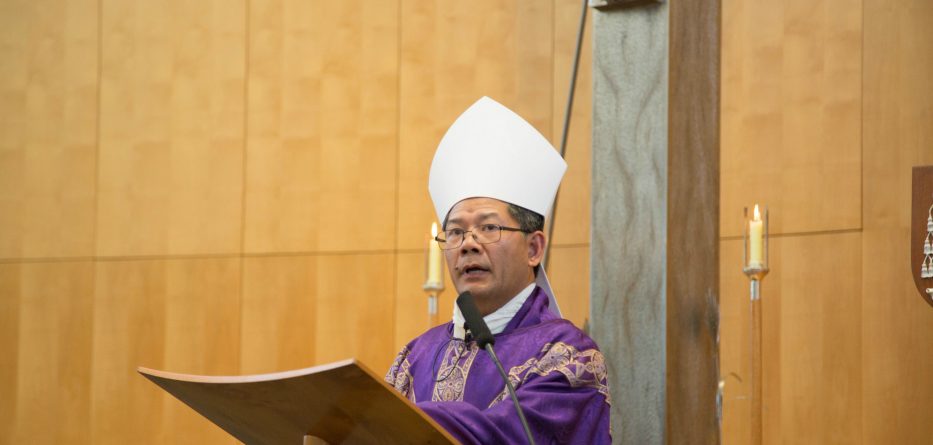Most Reverend Vincent Long Van Nguyen OFM Conv DD STL, Bishop of Parramatta
Homily for the Fifth Sunday of Lent in Year B 2018 with the Servants of Jesus Community, Seven Hills
18 March 2018
Dear friends,
Pope Francis is known as the pope of the periphery. Not only does he come from the ends of the earth, as he introduced himself to the crowds at his election five years ago, he also speaks and enacts the call to go to the periphery. Against opposition from all sides, he is simply unwavering in his solidarity with the poor, the oppressed and the marginalised. Indeed, it has been a constant feature of his papacy. He challenges the whole Church to abandon the security of the status quo and to embrace the risk of vulnerability. This is also the call of God’s word to us today.
In the first reading, the prophet Jeremiah speaks of the new covenant not written in stone as in former time but in the hearts of God’s people. Jeremiah was one of the great prophets during the time of great change and upheaval in Israel. The Temple had been destroyed and the Ark of the Covenant had been captured. These unprecedented acts of sacrilege and destruction had caused the people to turn to despair and disillusionment. Yet Jeremiah set out to do the impossible task, which was to restore faith and hope. He reminded the people of the journey into freedom from Egypt and the God who accompanied them.
This same God would lead them in a greater exodus to new life, freedom and hope. They were to be given to a new chance, a new heart in order to participate in God’s program of renewal and reordering of his people. Only this time, it would not be simply an occupation of the Promise Land as in former time, but more importantly a formation of a just and compassionate society that God wanted them to be.
In the Gospel, Jesus also speaks about the importance of vulnerability, the importance to take a risk, to give up the certainty of being a seed for the adventure of new life, new growth and new possibilities. The story begins with the Greeks or Gentiles wanting to meet Jesus. They had seen or heard of the many extraordinary things, or in John’s cryptic language, the many “signs” Jesus had done. For instance, he had healed the man born blind; he had raised Lazarus to life and he had made a triumphant entry into Jerusalem. These were all messianic “signs”, which pointed to the arrival of the long-awaited Messiah. The Gentiles were anxious to know who Jesus really was.
Yet ironically, their curiosity was satisfied in the way they had not expected. Instead of confirming the cult of his own personality Jesus talks about himself in terms of an anti-hero and a countercultural force. He uses the image of the grain in order to speak of his impending passion, death and resurrection. “Unless a wheat grain falls on the ground and dies, it remains only a single grain; but if it dies, it yields a rich harvest”. Like many of his parables, these words of Jesus compel us to look at his whole life and impact in order to understand their meaning.
Jesus refuses the hero worship and the power over the people in the wake of his miracles and extraordinary deeds. He is not the Messiah one who dwells on success and feasts on popularity. We are reminded of the temptations that Jesus experienced in the desert at the start of his ministry. He was tempted to do spectacular things, to be powerful, dominant and in control. He rejected them and instead, chose the path of vulnerable trust, the path of an antihero, a humble suffering Messiah.
Brothers and sisters,
As followers of Jesus, we are challenged by the message and example of Jesus. The Lenten journey requires of us to live more intensely the rhythm of dying and rising. What does it mean for us to be a wheat grain that is willing to die? How do we lose our lives in order to gain it back? These questions can only be answered by each of us as we endeavour to imitate Jesus who lived his life fully for others. As disciples, we recognise that life worth living is life poured out for others, life that embraces pain, suffering and even death for the sake of the one we love. This is what we call the paradox of the Gospel. Paul reminds us that while Jews demand signs and Greeks look for wisdom, we proclaim Christ crucified. The cross is at the heart of Christian discipleship.
In some ways, we are like the Jews who were in despair and disillusionment on account of the unprecedented change and upheaval which are happening around us. Yet just as the prophet Jeremiah pointed them to the program of renewal that God had in store for them, we too must see with God’s eyes our own crises. The church after the Royal Commission like the Jews after the exile must be the place where justice, compassion, mercy and the fullness of life are set above all other considerations. We need to convert to the radical vision of Christ and let it imbue our attitudes, actions and pastoral practices.
Let us pray that we respond to the message of Jesus, not by words but by attitudes and actions that reflect the radical vision of Christian life. Let us pray that we may be able to live fully that power in vulnerability especially during this time of the great cleansing and renewal in our Church. May all of us enact the rhythm of the Paschal Mystery of dying and rising in the pattern of our Lord.








